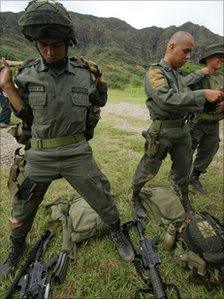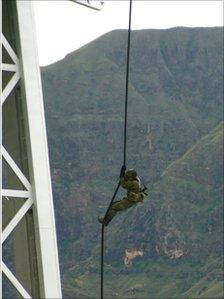UK helps Colombian commandos fight cocaine trade
- Published

Counter-narcotics commandos wear body armour in close-quarter battles
British intelligence and counter-narcotics agents are playing an increasingly active role in Colombia's war on drugs.
British agents, we discovered, are helping to run networks of informants in the country through vetted units of Colombians and setting up communications intercepts to try to stem the flood of South American cocaine coming into Britain.
In a lush green valley west of Bogota the police commandos line up for their turn.
One by one they grip the rope that dangles alarmingly down to the ground far below, then step off the metal platform and shin down at speed, breaking their fall at the last minute.
It's called "fast roping" and it's how the men of the Jungla, Colombia's elite police counter-narcotics commandos, train to descend from Black Hawk helicopters to seize remote cocaine laboratories deep in the jungle.
Set up by Britain's SAS in 1989, and trained by them, then the Americans, the Jungla have become largely self-sufficient.
They have even developed into a regional centre of excellence for Latin America, training other police commandos from Mexico, Peru and Bolivia.
"We want our men ready to deal with anything and as you have seen here, we are succeeding in the the fight against insurgents and drug-runners," said their chief instructor, Capt Edwin Carreno.
Well, perhaps not quite yet.
Last year 45% of Colombia's cocaine production was seized and destroyed - compared with just 4% in Peru.
That is not enough to put the drug barons out of business and they have become adept at protecting their laboratories and coca plantations with mines.
Back in Bogota, I was introduced to Patrolman Jorge Salazar, a police dog handler who lost his leg two months ago.
"We had already been patrolling for three hours and my dog was very tired. He went over a mine and failed to detect it. I trod on it," he explained.
The police counter-narcotics unit numbers more than 7,000 but they are up against a hugely lucrative business that lends itself to corrupting officials, sometimes forcing them to look the other way by threatening their families.
Lives wrecked
As Neil Giles - deputy director of the Serious Organised Crime Agency (Soca) - explained: "The cocaine trade globally is [worth] many billions of dollars.
"The UK trade is into the billions of pounds, so it is very worthwhile to get your cocaine to market. They will buy second-hand planes and take enormous risks flying them with huge plastic drums of additional fuel inside the fuselage and someone pumping it in to the engines as they run dry," he said.
The Colombian government says the trade wreaks enormous damage on their country, killing off the rainforest, polluting the rivers and wrecking lives.
So what is Britain doing to help?
"We've got a team of specialists that are working in Colombia, and other Latin American countries," explained Soca's deputy director.

Commandos drop from helicopters using ropes to swoop on remote cocaine labs
"They're embedded, some of them, with specialist units of Colombian law enforcement, they work very closely with them, they aid in their training, and their capacity, and they work hard to share intelligence that we can collect."
In practice, it means Britons are helping to run networks of informants in co-operation with Colombian police officers and helping to tap phone lines all over the country.
To see counter-narcotics up close for myself, I needed to head for the jungle, flying south in a tiny turboprop plane so small I could touch both sides inside with my arms outstretched.
Reaching the remote plantations is a hard slog.
The police take us through malarial swamps before we come to a plantation they've recently seized: thousands of coca bushes disguised in a banana grove.
Specially trained dogs check for explosives. The traffickers have been known to booby-trap the bushes to explode as they are pulled up.
The police admit that corruption is a real problem down here in Narino province. Unemployment is high and the drug cartels have plenty of money to spend.
Cement dust
"The location of Narino is strategic for them to produce the coke and to distribute it to other nations through the Pacific Ocean. That's why they concentrate the plantations right here and now they're going up through the Pacific coast," said Maj Jesus Quintero of Colombia's counter-narcotics police in Tumaco.
The police have found a jungle laboratory, complete with vats of chemicals.
The wooden floor is littered with coca leaves sprinkled with cement dust, the first stage in its long journey to refined cocaine.
The police prepare explosive charges and we move back a safe distance.
With a puff of smoke the lab evaporates. One less laboratory, one less shipment to Europe or the US.
But this is small stuff - it's unlikely to hurt the traffickers. And, longer term, there is a downside to Colombia's efforts.
The more success Colombia has against the traffickers, the more they are now shifting their operations across the border to other, more permissive countries.
The flow of cocaine to Britain is unlikely to stop any time soon.